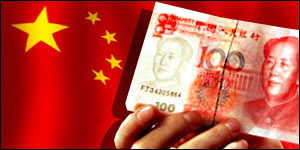China, iron-0re, and Australia: killing a chicken to frighten the monkeys.
Brian Hennessy. An Australian in China. July, 2009
Corruption in China. A controversial topic. A reality that should be discussed in the open, regardless of what damage it might do to China’s sensitive face. The arrest of Rio Tinto’s man in China, Mr Stern Hu, for allegedly offering a bribe, gives us pause for reflection on this topic. If this Australian-Chinese negotiator was dealing under the table, then he was simply following normal Chinese procedure.
China, iron-ore, and Australia: killing a chicken to frighten the monkeys.
_____________________________________________________________
Stern Hu’s contacts in government and in private industry (they are one and the same anyway) would have expected such behavior from him. Failure to operate according to these local business rules would have put him and his employer at a commercial disadvantage.
Regardless of which party to the negotiations offered a bribe or requested a fee for an illegal service, the fact remains that this kind of behavior is par for the course in China. In fact, the government of China is a routine breaker of its own laws in this regard.
Ask the local people: for example; the Long Chuan county office near Chengdu in Sichuan Province is known to them as ‘Corruption Castle’. A government office closer to my home in Chongqing is blessed with a similar moniker. These corruption castles are everywhere. They are a part of China’s glorious 2000 year old tradition(since the first emperor, Qin Shi Huang Di) of allowing government officers to milk their local populations for personal benefit. It is a culturally accepted practice. As it is in much of Asia.
Don’t be fooled by the occasional example of a high-flying official being punished for having his fingers in the till. These arrests are rarely the result of any general campaign against the evils of corruption. Rather, they are the result of political intrigue, and are an accepted means of getting rid of one’s enemies. For example; this is how Hu Jin Tau got rid of a troublesome Shanghai Party Secretary a couple of years ago.
So China should not add insult to injury by playing the corruption-card or threatening the world with punishment for the sale of so-called ‘state-secrets’. This spurious tactic won’t work. Better to spare us the hypocrisy, and tell us the real reason for this crude attempt at intimidation. A tactic which has the potential to do lasting damage to China’s global commercial reputation.
China is not a democracy; it is a dictatorship. China is not a market economy; it is a centrally controlled economy. Thus, when the pressure is on, China reverts to type: centrally controlled bullying.
Things haven’t been going China’s way lately. Internally as well as externally. So the barbarians within China’s borders are behaving as barbarians do anywhere: they throw their weight around to get what they want. And they want two things: (i) to pull their own people into line. Particularly the smaller iron ore companies within China which have been doing their own black-market deals with the larger importers; and, (ii) to intimidate foreign suppliers into seeing things China’s way.
Traditionally, when there have been internal rivalries between authorities, departments, or factions in China, leaders of these bodies would sometimes arrest and incarcerate subordinates of their enemy. This was common practice during the terror of Mao’s time, and is not unknown today.
For example: an uncle of a friend of mine ‘disappeared’ for several months recently, as a result of an internal investigation into a local institution. His distressed family had no idea of his whereabouts or why he had been arrested. He was released after two months without having been charged with any crime.
An old Chinese saying describes the logic behind such behaviour: it is called: “killing a chicken to frighten the monkeys.” Stern Hu is the chicken, and Rio Tinto is the monkey.
And the Chinese government doesn’t care what we think of it and its methods. The Chinese government only cares what its own people think of it. This is why China’s leadership group always plays to the home gallery when it is confronted with a mess of its own making. It does this by blaming outside forces for its difficulties.
For example; the Tibetan riots are blamed on the refugee Dalai Lama, the Uighur riots are blamed on the refugee Rebiya Kadeer, and China’s internal iron-ore corruption is blamed on nasty foreign corporations.
In fact, this iron-ore incident tells us more about China’s leadership group than it does about China’s problems with corruption in its own iron-ore industry. China’s leaders are not as secure as they would have everybody believe. And every poor peasant farmer in the hinterland, as well as every rich businessman on the coast, knows the reason why.
Australia should reassess its relationship with the Middle Kingdom. We have been kidding ourselves. And although this incident has exposed the lie about our ‘special relationship’ with china, it has also been a timely wake-up call for our business and political leaders.
China has done us all a favour by bursting this bubble. Only good can come of this. Prime Minister Kevin Rudd should hold his nerve. So far he and his Foreign Minister Stephen Smith have done all that they can do under the circumstances. China needs Australia just as much as Australia needs China.
–oo0oo–
.
.

